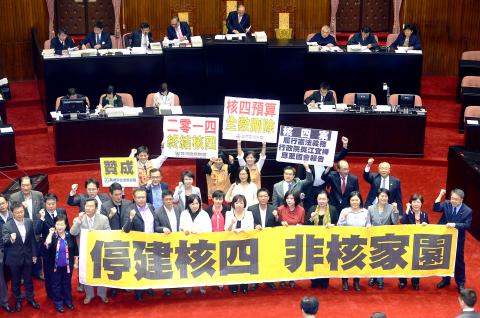Several Chinese Nationalist Party (KMT) legislators yesterday defied the party line on the issue of the Fourth Nuclear Power Plant during the legislative vote to change the discussion agenda.
The plant is located in New Taipei City’s Gongliao District (貢寮).
The ruling and opposition party caucuses yesterday locked horns over the addition of the nuclear issue to the agenda, after an attempt to do so was obstructed by the KMT at a meeting of the Procedure Committee on Tuesday.

Photo: Wang Yi-sung, Taipei Times
The Democratic Progressive Party (DPP) and the Taiwan Solidarity Union had asked for the agenda to include proposals in which Premier Jiang Yi-huah (江宜樺) would be required to deliver a special report to the legislature on the immediate termination of the construction and the slashing of the plant’s NT$8.1 billion (US$269 million) budget.
The KMT voted down the proposals, but not all of its members voted against.
KMT Legislator Lee Ching-hua (李慶華), whose constituency is in New Taipei City, defied instructions issued by his party and voted yes for proposals motioned by the opposition parties relating to the construction.
Also voting against the party were KMT legislators Lo Shu-lei (羅淑蕾), Ting Shou-chung (丁守中) and Lo Ming-tsai (羅明才), who voted for additions to next week’s agenda on Tuesday of the termination of the construction and the budget reductions.
The KMT caucus had demanded the presence of all its legislators for the ballot, and KMT deputy caucus whip Wang Ting-son (王廷升) had said that party discipline would be enforced, with fines imposed to punish those who failed to show up or voted against the party consensus.
After the vote, Lo told reporters that the KMT lawmakers “have no chance to express their own opinions.”
“You have to persuade us instead of forcing us to support [the party resolution], which is futile,” she added.
Lee said he believed that the party caucus was “well-aware of his stance [on the issue].”
Saying that he had once proposed holding a referendum on the termination of the plant’s construction — which he later retracted — Lee said it would have been lying to the public yesterday if he had not voted in the same way.
Meanwhile, the KMT also voted through a draft act to raise the requirements for recalling legislators.
The move has sparked controversy at a time when a campaign to recall various KMT legislators is ongoing.
The draft act, which requires that the petitioners provide photocopies of identity cards and affidavits — in addition to the existing requirements for name, address and identification number — was passed by the KMT majority last year and bypassed the standing committee’s deliberation for a direct second reading.
The opposition said, at the time, that the bill was a special clause for KMT Legislator Wu Yu-sheng (吳育昇), who was the target of a public recall campaign.
The KMT yesterday placed the bill on Tuesday’s agenda, which means it could pass a second reading with a floor vote.

SECURITY: As China is ‘reshaping’ Hong Kong’s population, Taiwan must raise the eligibility threshold for applications from Hong Kongers, Chiu Chui-cheng said When Hong Kong and Macau citizens apply for residency in Taiwan, it would be under a new category that includes a “national security observation period,” Mainland Affairs Council (MAC) Minister Chiu Chui-cheng (邱垂正) said yesterday. President William Lai (賴清德) on March 13 announced 17 strategies to counter China’s aggression toward Taiwan, including incorporating national security considerations into the review process for residency applications from Hong Kong and Macau citizens. The situation in Hong Kong is constantly changing, Chiu said to media yesterday on the sidelines of the Taipei Technology Run hosted by the Taipei Neihu Technology Park Development Association. With

CARROT AND STICK: While unrelenting in its military threats, China attracted nearly 40,000 Taiwanese to over 400 business events last year Nearly 40,000 Taiwanese last year joined industry events in China, such as conferences and trade fairs, supported by the Chinese government, a study showed yesterday, as Beijing ramps up a charm offensive toward Taipei alongside military pressure. China has long taken a carrot-and-stick approach to Taiwan, threatening it with the prospect of military action while reaching out to those it believes are amenable to Beijing’s point of view. Taiwanese security officials are wary of what they see as Beijing’s influence campaigns to sway public opinion after Taipei and Beijing gradually resumed travel links halted by the COVID-19 pandemic, but the scale of

A US Marine Corps regiment equipped with Naval Strike Missiles (NSM) is set to participate in the upcoming Balikatan 25 exercise in the Luzon Strait, marking the system’s first-ever deployment in the Philippines. US and Philippine officials have separately confirmed that the Navy Marine Expeditionary Ship Interdiction System (NMESIS) — the mobile launch platform for the Naval Strike Missile — would take part in the joint exercise. The missiles are being deployed to “a strategic first island chain chokepoint” in the waters between Taiwan proper and the Philippines, US-based Naval News reported. “The Luzon Strait and Bashi Channel represent a critical access

Pope Francis is be laid to rest on Saturday after lying in state for three days in St Peter’s Basilica, where the faithful are expected to flock to pay their respects to history’s first Latin American pontiff. The cardinals met yesterday in the Vatican’s synod hall to chart the next steps before a conclave begins to choose Francis’ successor, as condolences poured in from around the world. According to current norms, the conclave must begin between May 5 and 10. The cardinals set the funeral for Saturday at 10am in St Peter’s Square, to be celebrated by the dean of the College